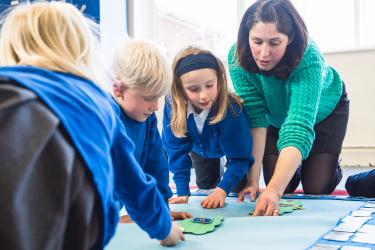Differentiating Teaching for Gifted Readers in Key Stage One: Strategies for Success
Gifted readers in Key Stage One have unique needs that require differentiated teaching to support their advanced reading abilities. In this blog post, we will explore strategies for meeting the needs of gifted readers, creating a challenging and engaging learning environment, providing advanced reading materials, fostering critical thinking skills, collaborating with parents, monitoring progress, and celebrating achievements.
Understanding the Needs of Gifted Readers
Gifted readers in Key Stage One demonstrate advanced reading skills and a deep love for books.  They have a larger vocabulary, strong comprehension skills, and an ability to make connections between texts. These pupils often crave intellectual stimulation and may become disengaged if not challenged. To meet the needs of gifted readers, teachers must provide differentiated teaching that matches their abilities and interests.
They have a larger vocabulary, strong comprehension skills, and an ability to make connections between texts. These pupils often crave intellectual stimulation and may become disengaged if not challenged. To meet the needs of gifted readers, teachers must provide differentiated teaching that matches their abilities and interests.
Strategies for Differentiating Instruction
There are several strategies that teachers can use to differentiate teaching for gifted readers. One approach is flexible grouping, where pupils are grouped based on their reading abilities and given tasks that align with their level of understanding. Another strategy is curriculum compacting, which involves condensing the curriculum for gifted readers who have already mastered certain skills. Tiered assignments are also effective, as they provide different levels of complexity for pupils to choose from.
Creating a Challenging and Engaging Learning Environment
 Giving gifted readers a challenging and engaging learning environment is essential for their growth and development. Teachers can incorporate higher-level thinking activities, such as open-ended questions and problem-solving tasks, to stimulate their critical thinking skills. Providing opportunities for independent research and project-based learning also allows gifted readers to explore topics of interest in-depth.
Giving gifted readers a challenging and engaging learning environment is essential for their growth and development. Teachers can incorporate higher-level thinking activities, such as open-ended questions and problem-solving tasks, to stimulate their critical thinking skills. Providing opportunities for independent research and project-based learning also allows gifted readers to explore topics of interest in-depth.
Providing Advanced Reading Materials and Resources
Gifted readers require reading materials that are challenging and align with their interests. Teachers should select books and resources that go beyond the typical Key Stage One curriculum and provide opportunities for deeper analysis and interpretation. Access to a variety of genres and formats, such as graphic novels and non-fiction books, can also help to keep gifted readers engaged.
Fostering Critical Thinking and Analysis Skills
Developing critical thinking and analytical skills is crucial for gifted readers. Teachers can encourage these skills by engaging pupils in thought-provoking discussions, encouraging them to ask questions, and providing opportunities for problem-solving. Analysing complex texts and making connections between different pieces of literature can also help to develop these skills.
Collaborating with Parents and Guardians
 Parents and guardians play a key role in supporting the learning and development of gifted readers. Teachers should involve them in the educational process by providing resources and suggestions for activities that can be done at home. Regular communication with parents can help to ensure that the needs of gifted readers are being met both in the classroom and at home.
Parents and guardians play a key role in supporting the learning and development of gifted readers. Teachers should involve them in the educational process by providing resources and suggestions for activities that can be done at home. Regular communication with parents can help to ensure that the needs of gifted readers are being met both in the classroom and at home.
Monitoring and Assessing Progress
It is important to monitor the progress of gifted readers to ensure that they are continually challenged and making progress. Teachers can use a variety of assessment methods, such as informal observation, reading conferences, and written assignments, to assess their learning outcomes. Regular feedback and reflection can help to guide teaching and ensure that the needs of gifted readers are being addressed.
Celebrating Achievements and Encouraging a Love for Reading
Gifted readers should be celebrated for their achievements and encouraged to continue their love for reading. Teachers can create a supportive and positive classroom environment by recognising and showcasing the accomplishments of gifted readers. Providing opportunities for them to share their favourite books and recommend titles to their peers can also help to foster a love for reading.
How Can Mighty Writer Help?
Mighty Writer engages all types of learners in the way it is designed and used. It allows children to become confident and accomplished writers, supporting, challenging and motivating them along the way.
It does this in 5 key ways...
